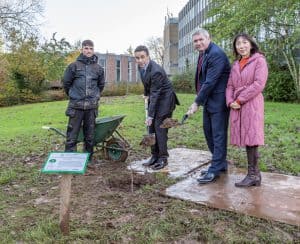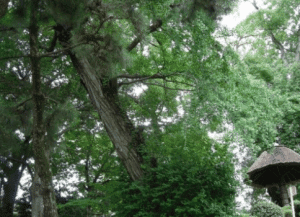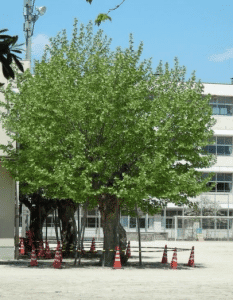Stranmillis plants Survivor Trees – a symbol of caution and hope

On Thursday 24 November, Stranmillis University College was thrilled to welcome Yukari Norris, Chair of the Japan Society of Northern Ireland and David Dowd from Greenmount College, for a very special tree planting ceremony as part of the College’s Centenary Celebration – the planting of three Hiroshima survivor trees, a Maidenhair Tree (Gingko Biloba) and two Oriental Plane Tree (Platanus Orientalis).
On 6 August 1945, an atomic bomb was exploded over the city of Hiroshima in Japan. The blast and resultant firestorm devastated the city, with the death toll estimated at up to 146,000 and over two-thirds of the city’s buildings completely destroyed. Only 170 trees within a 2km radius of the blast’s hypocentre survived.
The Green Legacy Hiroshima project was established to safeguard and spread seeds of Hiroshima’s A-Bomb survivor trees. Set up by two friends, Nassrine Azimi and Tomoko Watanabe, seeds from the “Hibaku-jumoku” (Japanese for survivor trees) are entrusted to partner organisations around the world. The saplings, grown from the seeds, carry a message of caution and hope; the caution of the destructive power of war but also the hope, resilience and regenerative power of mankind and nature. Trees from the Hibaku-jumoku are now growing in more than 30 countries worldwide. The College of Agriculture, Food and Rural Enterprise CAFRE), Greenmount Campus, is one of the partners of the Green Legacy Hiroshima project, and through our Senior Gardener, Aodhan Donaghy, a graduate from Greenmount, the College is delighted to be partnering with CAFRE on this wonderful initiative. When at Greenmount, Aodhan actually planted the seed and tended the growing sapling of Gingko tree planted today
Speaking at the planting ceremony, Stranmillis Principal and CEO, Prof. Jonathan Heggarty said: “It is a real honour and privilege for the College to be partnering with Greenmount on this important project, and to be planting three trees with such a history. For the past one hundred years, Stranmillis’ mission has been the transforming of the lives of children and young people. It is particularly poignant that two of the trees being planted here today comes from a Plane tree originally planted by students of Tenma Elementary School to celebrate their graduation. Fourteen years later, the school was destroyed by the bomb and 13 staff and 280 students died. The Plane trees have become symbols of love and peace, held in high affection by students in Hiroshima today. As with the other the trees planted from seeds of the “Hibaku-jumoku” around the world, the three new trees here at Stranmillis will serve as a living symbol of hope and peace for our students, staff, graduates and visitors for generations to come.”
About the trees
Ginkgo Tree 
Species: Ginkgo Biloba
Distance from the hypocenter: 1370m
Location: Shukkeien Garden
Shukkeien Garden was created in 1620 by one of the greatest tea masters of that time and the tea school originated by him has continued for 16 generations. There are three A-bombed trees in the garden: a ginkgo, a black pine and a muku. The ginkgo tree is more than 200 years old. It slants towards the blast’s hypocenter because after the blast moved outward from the city center, the air then gushed back in. The trunk of the tree is about 4 meters in circumference and it is about 17 meters tall. After the atomic bomb, many people fled to the garden and died there.
Plane Tree 
Species: Platanus Orientalis
Distance from the hypocenter: 1270m
Location: Tenma Elementary School
There are four A-bombed plane trees at Tenma Elementary School. They were planted in 1931 by the students who were graduating that year. The school buildings were all destroyed by the bomb, and 13 teachers/staff members and 280 students died. Students wrote the words of the song, “Winds Blowing the Plane Trees.” The plane trees have become symbols of love and peace and held in affection by students and local people alike.
Reasons to study at Stranmillis
Student Satisfaction
Stranmillis is ranked first in Northern Ireland for student satisfaction.
Work-based placements
100% of our undergraduate students undertake an extensive programme of work-based placements.
Study Abroad
All students have the opportunity to spend time studying abroad.
Student Success
We are proud to have a 96% student success rate.
